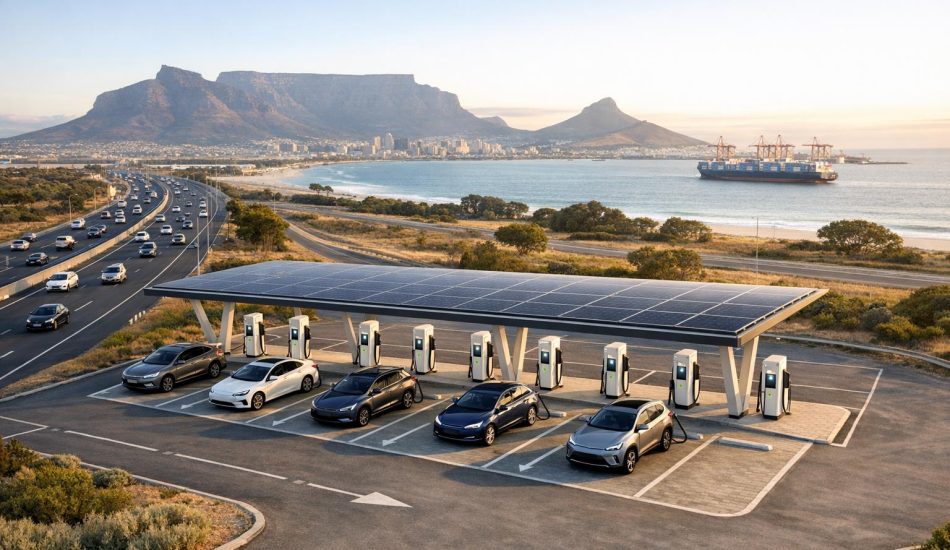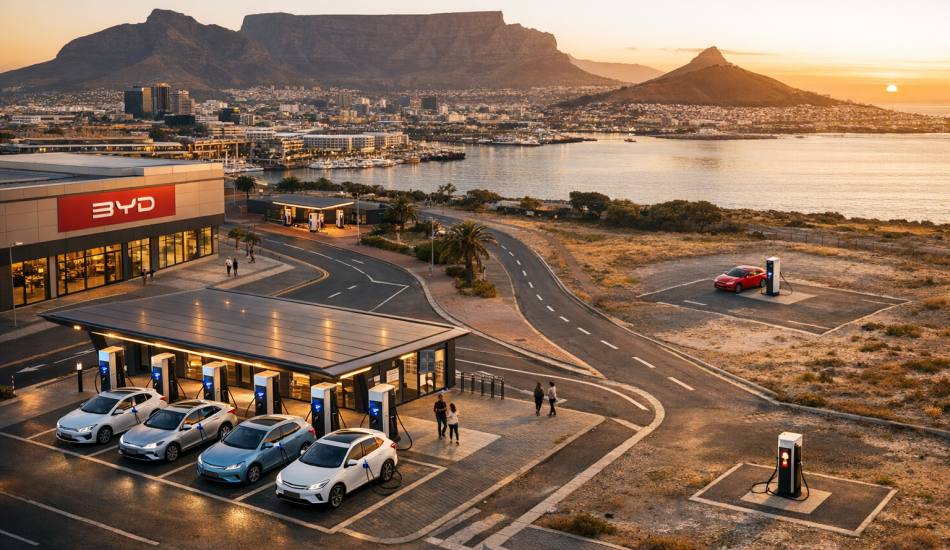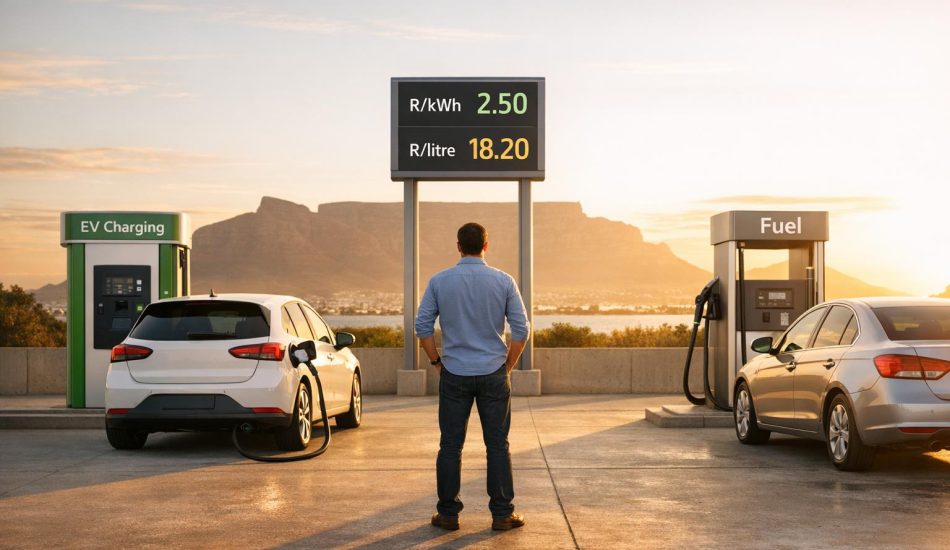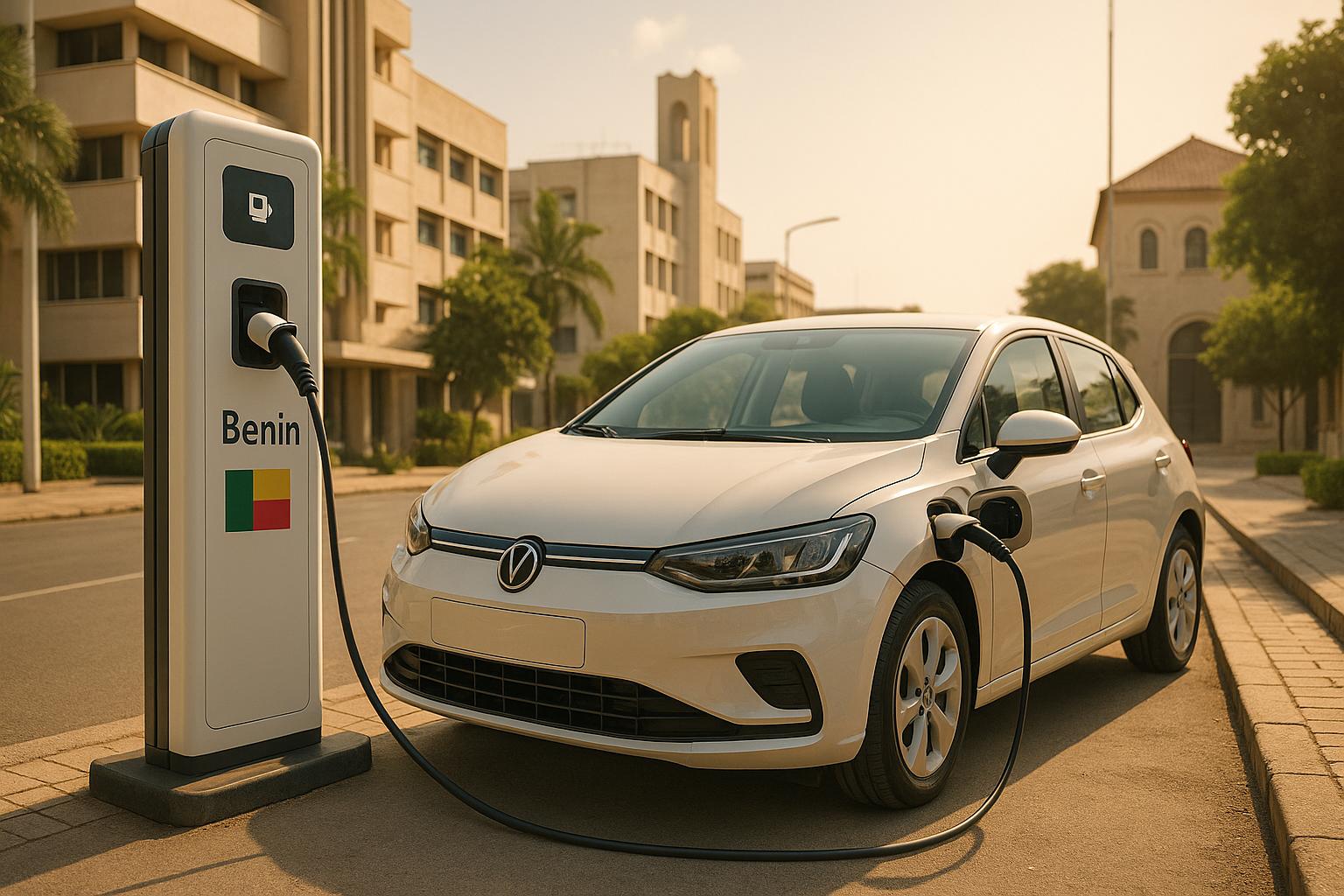
Benin’s electric vehicle (EV) market is emerging, driven by rising fuel costs, government policies, and urban interest in cleaner transportation. While still in its early stages, the market shows potential for growth in urban areas like Cotonou and Porto-Novo. Here’s what you need to know:
- Current Market: EVs are mostly imported, with affordable models like the Geely Panda Mini ($5,880) gaining traction. Premium options like Tesla Model Y ($47,000+) are also available but cater to higher-income buyers.
- Infrastructure: Charging stations are scarce, with most users relying on private setups. Plans include solar-powered stations and grid integration to expand access.
- Government Role: Policies under discussion include reduced EV import duties and renewable energy initiatives to support adoption.
- Challenges: High upfront costs, limited awareness, and infrastructure gaps hinder adoption. Flexible financing and education campaigns are proposed solutions.
- Opportunities: The market is expected to grow from $450M in 2025 to $4.2B by 2030, offering opportunities for global brands, local entrepreneurs, and public-private partnerships.
Benin’s EV market is at a turning point, with growing interest and investments shaping its future. Addressing affordability and infrastructure gaps will be key to accelerating adoption.
BYD Expands in Africa, Now in 16 Countries Including Benin
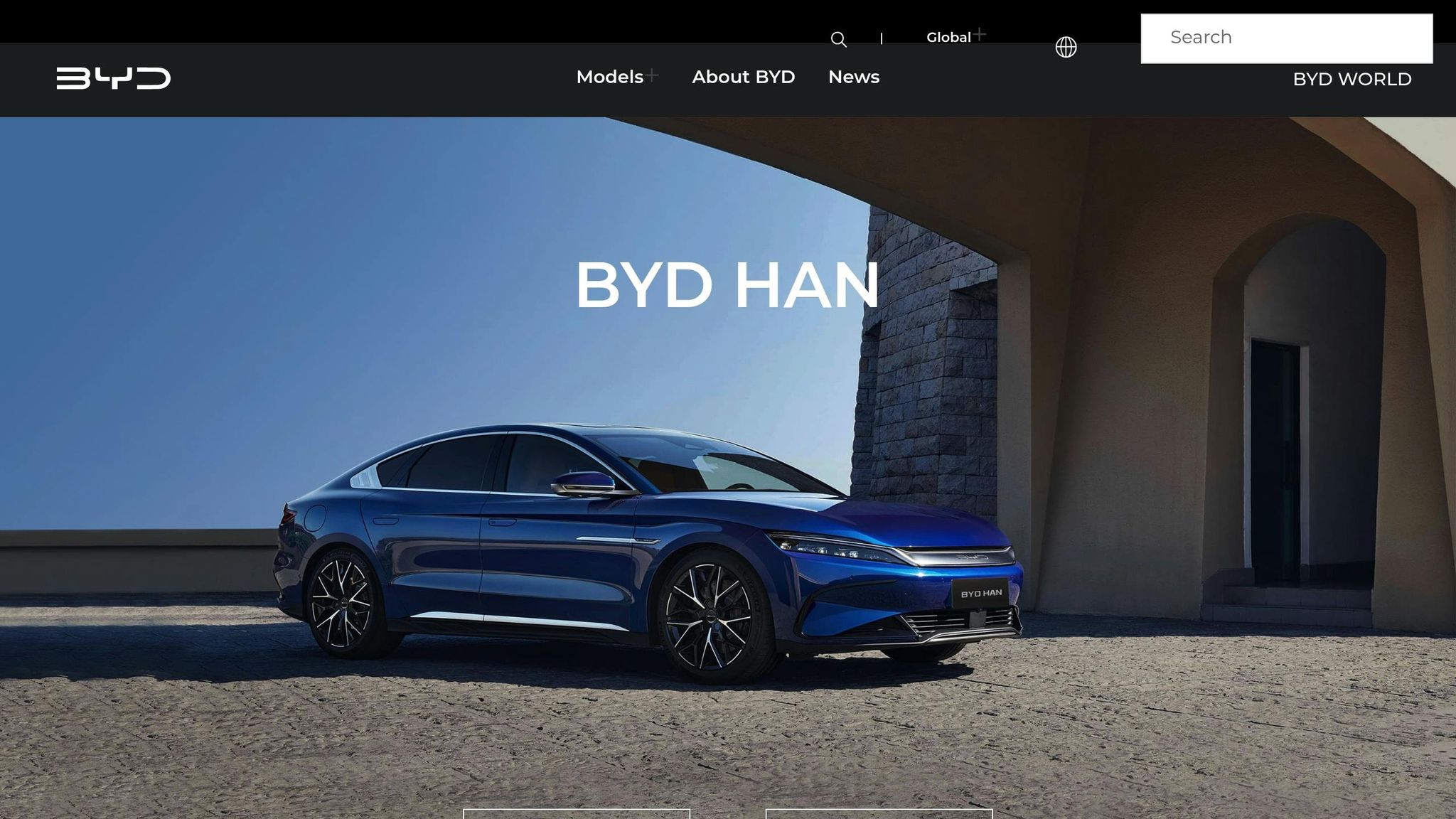
Electric Cars Available in Benin
Benin’s electric vehicle (EV) market is still in its early stages, with most options coming from Chinese and international imports. While the variety isn’t as extensive as in more mature markets, several brands and models are starting to gain traction, shaping the country’s growing EV landscape.
EV Models on the Market
BYD has emerged as a strong contender in the affordable EV segment. The BYD DOLPHIN ACTIVE, priced at $11,800, is one of the most economical options, offering an entry point for budget-conscious buyers. For those looking for more features and extended range, the BYD ATTO 3 2025 is available at $47,500.
Chinese manufacturers dominate the lower price brackets. The GEELY PANDA MINI BASE, priced at just $5,880, is the most affordable new EV in Benin. Other budget-friendly models include the LEAPMOTOR T03, which costs $12,000, and DONGFENG‘s NanoBox, available for $8,300. These compact, efficient vehicles are well-suited for urban driving.
For buyers with a larger budget, premium models like the ZEEKR 009 at $85,000 and the AITO M9 EV at $77,490 cater to those seeking luxury and advanced features. Tesla models, including the Model 3 and Model Y, are also available, offering a range of options for higher-end consumers.
| Model | Brand | Price Range (USD) | Category |
|---|---|---|---|
| PANDA MINI BASE | Geely | $5,880 | Budget Compact |
| NanoBox | Dongfeng | $8,300 | Urban Compact |
| DOLPHIN ACTIVE | BYD | $11,800 | Entry Sedan |
| T03 | Leapmotor | $12,000 | Compact |
| Model 3 | Tesla | $35,000 – $55,000 | Premium Sedan |
| ATTO 3 | BYD | $47,500 | Mid-range SUV |
| Model Y | Tesla | $47,000 – $62,000 | Premium SUV |
These models must contend with Benin’s unique road and climate conditions to prove their practicality.
Local Market Fit
Benin’s road infrastructure plays a significant role in determining which EVs are suitable. SUVs and vehicles with higher ground clearance, such as the BYD Yuan Plus and Tesla Model Y, are better equipped to handle the mix of smooth urban roads in cities like Cotonou and rougher terrain in rural areas.
The country’s tropical climate poses additional challenges. Battery performance can be affected by heat and humidity, making EVs with robust thermal management systems more reliable. Budget models may struggle in this regard, as their thermal management features are often less advanced.
Affordability remains a major hurdle for many potential buyers. With most EVs priced above $10,000, they are primarily accessible to urban professionals and businesses. However, the introduction of models like the Geely Panda Mini, priced under $10,000, marks an important step toward making EVs more attainable for a broader audience.
Another key concern is range anxiety, especially given the limited charging infrastructure. EVs with a range of 200+ miles are more appealing to those who need the flexibility to travel between cities or to rural areas where charging options are scarce.
Expanding Brand Options
To address the challenges of limited dealership networks, new platforms are stepping in to expand access to EVs. One such platform is EV24.africa, which helps bring a wider variety of electric cars to Benin.
EV24.africa simplifies the process of importing EVs by offering a range of services, including shipping, customs clearance, and local registration. This platform provides access to brands like Tesla, BYD, Volkswagen, XPeng, Leapmotor, Changan, Wuling, Mercedes-Benz, Citroën, and Peugeot.
By delivering to 54 African countries, EV24.africa introduces models that might not yet have a physical presence in Benin. This includes well-known European brands like Volkswagen and Mercedes-Benz, which appeal to buyers looking for Western automotive quality, and newer Chinese brands like XPeng and Changan, which offer competitive features at moderate prices.
Additionally, financing options available through platforms like EV24.africa could make higher-end EVs more accessible. Payment plans tailored to local income levels could help expand the market, moving beyond cash-only purchases and opening up opportunities for more consumers to adopt electric vehicles.
Charging Infrastructure: Current State and Development Plans
Benin’s electric vehicle (EV) charging infrastructure is still in its early stages. The limited availability of public charging stations poses a significant challenge to wider EV adoption.
Existing Charging Options
Currently, information about charging options in Benin is sparse. Most EV owners rely on private charging setups at home or installations at service centers. With public charging networks still in their infancy, finding reliable and convenient charging locations remains a hurdle. This lack of infrastructure highlights the need for a well-planned expansion.
Network Expansion Plans
Expanding Benin’s charging network will require collaboration between government bodies and private investors. Proposed strategies include:
- Building public charging stations in both urban and rural areas.
- Leveraging solar energy to power charging stations, tapping into Benin’s renewable energy potential.
- Providing a variety of charging options, from standard AC chargers to faster technologies, to meet different consumer needs.
These plans can gain momentum through the adoption of emerging technologies and strategic partnerships.
Technology and Partnerships
Advances in battery technology and smart charging systems will play a critical role in improving Benin’s charging infrastructure. Key focus areas include:
- Establishing standardized charging protocols to ensure all EV models are compatible.
- Seamlessly integrating charging stations with the existing electrical grid.
- Developing payment systems tailored to local economic conditions.
Although details are still emerging, the success of these efforts will depend on thoughtful planning and cooperation among stakeholders. A well-coordinated approach could pave the way for a more accessible and reliable charging network in Benin.
sbb-itb-99e19e3
Investment and Business Opportunities in Benin’s EV Market
Benin’s electric vehicle (EV) market is set to expand significantly, with projections estimating growth from $450 million in 2025 to $4.2 billion by 2030. This rapid growth opens up exciting prospects for international brands and local entrepreneurs alike, particularly as efforts to expand charging infrastructure and address adoption challenges continue to gain momentum.
Market Entry for Global EV Brands
For international EV manufacturers, entering Benin’s market has never been easier, thanks to platforms like EV24.africa. This marketplace imports and sells vehicles from some of the world’s biggest names, including Tesla, BYD, Volkswagen, XPeng, Leapmotor, Changan, Wuling, Mercedes-Benz, Citroën, and Peugeot. It simplifies market entry by handling import processes and logistics, which can otherwise be daunting for newcomers.
The platform approach is especially effective in emerging markets like Benin, where navigating regulatory requirements and logistics can be complex. By leveraging such platforms, global brands can gain immediate access to local buyers without needing to establish a full-scale presence in the country. With operations spanning all 54 African markets, platforms like EV24.africa offer a level of reach and infrastructure that would take years for individual brands to build independently.
Local Business Development
Benin’s EV ecosystem also presents numerous opportunities for local entrepreneurs and small-to-medium enterprises. Beyond selling vehicles, there’s a growing need for businesses that can fill gaps in the value chain, particularly in areas like charging station installation, EV maintenance, and battery recycling.
As battery-electric vehicles dominate the African market, accounting for 79.23% of revenue in 2024, specialized maintenance services are becoming increasingly important. Local businesses can step in by offering services tailored to EVs, such as routine checkups, battery diagnostics, and replacement services. Establishing service centers focused on EV-specific needs could cater to this rising demand.
The charging infrastructure sector is also ripe for innovation. With Benin’s abundant solar energy potential, entrepreneurs have the chance to develop solar-powered charging stations. This approach not only addresses the infrastructure gap but also aligns with the push for sustainable energy solutions. Across Africa, creative financing models like micro-leasing and battery-swap networks are gaining traction, particularly for two-wheelers, providing another avenue for local businesses to explore.
Public-Private Partnerships
Public-private partnerships (PPPs) can play a pivotal role in accelerating the development of Benin’s EV market. By combining government incentives with private sector expertise, these partnerships can drive infrastructure growth and boost adoption rates. Programs like government-backed grants, tax holidays, and zero-duty import schemes for EVs and charging equipment have already shown success in other African countries.
Take Ghana, for example: its 8-year zero-tariff policy on EV imports attracted significant OEM assembly investments. Similarly, Kenya’s VAT exemptions and reduced electricity tariffs for e-mobility led to a five-fold increase in EV registrations in 2023. These examples highlight how well-designed incentives can make a significant impact, offering a roadmap for Benin to follow.
| Country | Key EV Policy/Incentive | Impact on EV Adoption | Relevance to Benin |
|---|---|---|---|
| Ethiopia | Ban on ICE imports | >60% EV share of new sales (2025) | Demonstrates the power of regulatory action |
| Ghana | 8-year zero-tariff on EV imports | Attracted OEM assembly investment | Model for reducing import costs |
| Kenya | VAT exemption + discounted electricity | 5x rise in EV registrations (2023) | Shows the effect of financial incentives |
Collaborative models under PPPs can include the government providing land or regulatory support while private companies contribute capital and technology. These co-investment strategies have already proven effective in other regions, accelerating infrastructure rollout and market development.
For Benin, the key to success lies in creating partnerships that deliver value to both public and private stakeholders. Drawing lessons from neighboring countries, Benin can craft policies and programs that attract investment, build infrastructure, and support the widespread adoption of EVs. By doing so, the country positions itself as a rising player in Africa’s EV revolution.
Addressing EV Adoption Challenges
Benin’s electric vehicle (EV) market is grappling with several obstacles that are slowing its growth. Tackling these challenges with focused strategies could unlock the market’s potential and accelerate adoption.
Building Consumer Awareness
A major roadblock to EV adoption in Benin is the lack of consumer awareness. Many people aren’t familiar with the cost-saving advantages of EVs, such as lower fuel and maintenance expenses, or their positive impact on the environment. This knowledge gap often leaves potential buyers hesitant to explore EV options.
Neighboring countries like Kenya and Rwanda have shown how impactful targeted education campaigns can be. By teaming up with local media, community leaders, and schools, these countries successfully spread the word about EV benefits. Key messages emphasized long-term savings, reduced dependence on fuel, and cleaner urban air.
For Benin, a similar approach could work wonders. Educational campaigns should use relatable examples, like comparing monthly fuel costs of traditional vehicles to the electricity costs of charging an EV. Highlighting the minimal maintenance required for electric motors compared to internal combustion engines can also shift perceptions about ownership costs.
Community outreach programs involving local influencers and early adopters could help build trust in EV technology. Hosting test drive events and live demonstrations would give potential buyers a chance to experience EVs firsthand, easing concerns about performance and reliability. These efforts would naturally complement infrastructure improvements, like expanding charging networks.
Fixing Infrastructure Gaps
Another major hurdle is the lack of charging infrastructure. Limited access to charging stations, coupled with unreliable rural electricity grids, has made it difficult for EVs to gain traction outside urban areas.
Creative solutions can help address this. Modular, off-grid charging stations – especially solar-powered ones – and battery-swap networks are promising alternatives. These systems can operate independently of the centralized grid, making them ideal for Benin’s varied terrain and energy challenges.
Solar-powered charging stations, in particular, are a great fit for Benin’s sunny climate. These stations can generate clean energy on-site, offering a sustainable way to power EVs. Collaborations with renewable energy providers and local businesses could speed up the rollout of such decentralized networks.
Flexible payment models, like pay-per-use or micro-leasing, could also lower the initial costs for both operators and users. These approaches have worked well in other African markets and could be tailored to Benin’s specific needs.
Battery-swap networks are another viable option, especially for two-wheelers and smaller vehicles. This model allows users to quickly exchange depleted batteries for fully charged ones, cutting down wait times and reducing the upfront cost of owning an EV. With such infrastructure in place, EVs become more practical and appealing to a wider audience.
Making EVs More Affordable
For many in Benin, the high upfront cost of EVs is a significant barrier. While EVs are cheaper to maintain and fuel over time, the initial purchase price can be daunting. Addressing this affordability issue requires creative financing options and supportive policies.
Platforms like EV24.africa are already making strides by offering transparent pricing and flexible payment plans, which spread out the cost of ownership over time. Additionally, the availability of entry-level EV models priced under $10,000 is helping to make electric mobility more accessible.
Flexible financing models, proven successful in markets like Kenya and Nigeria, could also be introduced in Benin. These models allow buyers to avoid large down payments, making EVs attainable for middle-income households.
Government policies could play a crucial role as well. Measures like reduced import duties, tax breaks, or direct subsidies could significantly lower the cost of EV ownership. While Benin’s policy framework is still in its early stages compared to countries like Ghana or Rwanda, adopting similar strategies could pave the way for greater EV adoption.
| Challenge Area | Current Barrier | Potential Solution | Expected Impact |
|---|---|---|---|
| Consumer Awareness | Limited knowledge of EV benefits | Community outreach and education campaigns | Increased consumer interest and confidence |
| Charging Infrastructure | Weak grid reliability, high costs | Solar-powered and modular charging stations | Expanded charging access, especially rurally |
| Vehicle Affordability | High upfront costs | Flexible financing and micro-leasing options | Broader market access across income levels |
Conclusion and Key Takeaways
Benin’s electric vehicle (EV) market is on the verge of significant growth, presenting opportunities for both increased EV adoption and the expansion of charging infrastructure. While challenges like limited infrastructure, affordability, and consumer awareness may slow progress, addressing these barriers could unlock the market’s potential.
A well-thought-out charging strategy is essential. Decentralized, solar-powered charging stations can provide a sustainable way to enhance EV accessibility, especially in both urban hubs and rural areas where infrastructure is often lacking.
The investment outlook is promising. Affordable entry-level EV models, paired with flexible financing options, are making electric mobility a reality for more consumers. These developments are paving the way for a broader demographic to embrace EVs.
Supportive government policies can further accelerate this growth. Measures like reduced import duties, targeted tax breaks, and direct subsidies could position Benin as a leader in sustainable transportation across the region.
Private sector involvement is equally critical. Expanding the charging network and launching consumer education campaigns can build trust and encourage adoption. Together, these public and private initiatives create a clear path forward for EV growth in Benin.
FAQs
What is being done to expand charging infrastructure for electric vehicles in Benin?
Efforts in Benin are focused on expanding the charging infrastructure for electric vehicles (EVs) in ways that suit local needs. A standout initiative involves deploying solar-powered off-grid charging stations, specifically targeting motorcycle taxis, or zemidjan. By relying on renewable energy, this solution tackles power supply issues while supporting a critical mode of transportation.
There are also plans to upgrade the zemidjan fleet by introducing electric motorcycles. This move aims to accelerate EV adoption and build a transportation system that’s both sustainable and practical for the local population.
What opportunities does Benin’s growing electric vehicle market offer to local entrepreneurs?
Benin’s growing electric vehicle (EV) market is opening up a range of opportunities for local entrepreneurs. With the increasing demand for EVs, one area ripe for investment is the development and management of charging infrastructure – an essential component for encouraging widespread EV use. Beyond that, there’s room for businesses to thrive in vehicle maintenance services and the distribution of EV parts, both of which are crucial for supporting the expanding EV ecosystem.
The rise of EV manufacturing in the region also brings the potential for job creation and new business ventures. Entrepreneurs could consider getting involved in local assembly operations, which not only help cut costs but also make EVs more affordable for the community. Plus, EVs come with lower running costs, such as reduced fuel and maintenance expenses, making them an appealing choice for taxi and ride-sharing services. This shift creates fresh revenue opportunities for business owners ready to embrace the change.
What is the government doing to make electric vehicles more affordable and accessible in Benin?
The government of Benin is rolling out new policies to make electric vehicles (EVs) easier on the wallet and more available to its citizens. One of the standout measures is the removal of VAT and customs duties on fully electric vehicles, which significantly lowers the cost of importing and buying them.
On top of that, businesses putting money into renewable energy projects, including those tied to EVs, can take advantage of tax breaks and exemptions, especially in designated Special Economic Zones (SEZs). These initiatives are designed to boost EV adoption and promote the development of cleaner, more sustainable transportation options across the country.


